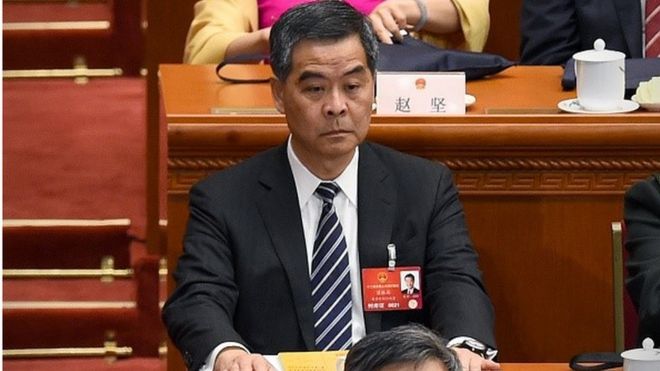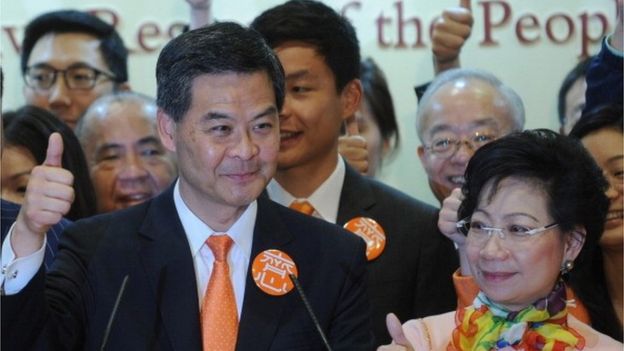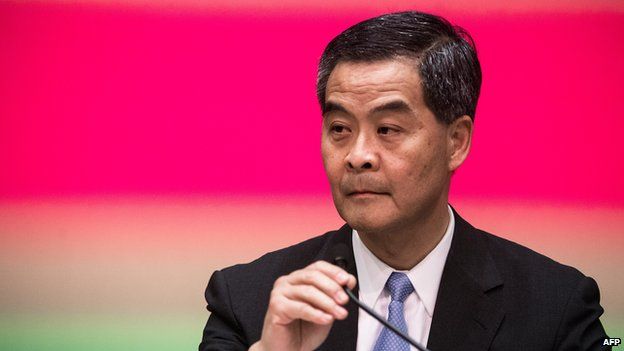HK leader under pressure over airport luggage claim
- 8 April 2016
- China
 AFP
AFP
Hong Kong leader CY Leung is facing public pressure after a media report said he put pressure on airport staff to bypass security rules.
The Apple Daily alleged he had asked Cathay Pacific staff to help his daughter retrieve her carry-on luggage which had been left outside the restricted area on 28 March.
The bag was then delivered directly to the gate in violation of procedure, the report said.
But Mr Leung denies speaking to staff.
The chairwoman of the Democratic Party, Emily Lau, has asked for an independent investigation into the incident.
'No contact with staff'
According to airport security rules, passengers must exit the restricted area to get any left behind luggage and go through immigration again.
The paper's report said Leung Chung-yan, 23, was at the boarding gate for her flight to San Francisco from Hong Kong International airport when she realised she had left her carry-on bag outside the restricted area.
Her mother, Regina Leung Tong Ching-yee, who was in the restricted area as a "special person" to see her off asked the staff to bring the luggage to the gate, Apple Daily said. The staff declined to do so.
 AFP
AFP
Apple Daily says Ms Leung then called her father, who they allege then asked that the luggage be brought into the restricted area. The staff then brought the luggage as a "special case", the report said.
In a statement late on Wednesday, Mr Leung said although he knew about the incident, he did not have any contact with airport staff "let alone exerting pressure on them".
He denied that Mrs Regina Leung was in the restricted area and also that he had asked staff to address him as "Chief Executive Leung".
Hong Kong profile - Leaders
- 19 June 2015
- Asia
Chief executive: Leung Chun-ying

Pro-Beijing politician Leung Chun-ying's tenure has been marked by recurring political battles with Hong Kong's pro-democracy opposition.
Mr Leung succeeded Donald Tsang - who had served the maximum two terms allowed - in 2012 to become Hong Kong's third chief executive through an unusually bitter electoral contest with another pro-China candidate, Mr Tsang's former deputy Henry Tang.
Mr Tang won an unprecedented 24% of the votes in the electoral college, despite reports of strong Chinese pressure on his supporters to back Mr Leung.
As a result, Mr Leung was felt to have a weak mandate, and took office amid major public protests against a lack of democracy and growing inequality.
Since coming to power, Mr Leung's government says it made strides fulfilling his pledges to combat poverty and rein in Hong Kong's high housing costs.
Tensions
A plan to introduce pro-China "patriotic lessons" in schools led protests and then an embarrassing climb-down on the eve of legislative elections in September 2012, at which pro-democracy parties retained enough seats to veto constitutional change.
The stand-off with pro-democracy forces reached new heights in 2014, when Mr Leung indicated his support for China's view that only candidates chosen by a nominating committee should stand in direct universal elections for the post of chief executive, due to start in 2017.
Activists responded with an unofficial pro-democracy referendum in which almost 800,000 residents took part, and pro-democracy protesters occupied large parts of central Hong Kong. In June 2015 the Legislative Council rejected the election proposal.
Mr Leung has also faced growing discontent at the influx of traders from mainland China who buy goods in the territory to sell back home.
Born in 1957, Mr Leung studied in Britain before returning home to work as a surveyor in 1977. He entered political life in 1985 as a member of the Consultative Committee that drew up the Basic Law of post-colonial Hong Kong.
After a lucrative career in property development, involving acting as advisor to several provinces in China, Mr Leung entered politics in the pro-China camp, rising to membership of Hong Kong's ruling Executive Council and China's People's Political Consultative Conference parliamentary body.
Profile: Donald Tsang | |||
Donald Tsang, re-elected on Sunday as Hong Kong's leader, remains a popular figure.
A recent survey found Hong Kong's chief executive is almost as well-liked now as when he first succeeded Tung Chee-hwa just under two years ago.
This is despite widespread unhappiness about the slow pace of democratic reform under his leadership.
An 800-member committee of officials loyal to Beijing determined the outcome of Sunday's election, with Hong Kong's seven million residents having no direct say.
Skilled administrator
A career civil servant and former deputy to Mr Tung, Mr Tsang is respected for his skills as an administrator, his calm demeanour and his strong financial acumen.
In contrast to his predecessor, he is also flamboyant, articulate and deals well with the media.
But critics of his period in office say he has lacked the political expertise and strength of personality to juggle the expectations of a restive public, a divided legislature and the Beijing government.
In particular, his aborted efforts to introduce some limited democratic reforms into Hong Kong's political system were heavily criticised.
Mr Tsang, 62, was born in October 1944, the son of a Hong Kong police officer.
Unlike most senior civil servants in Hong Kong, he did not attend university, joining the colonial government in 1967.
He is married with two sons, with hobbies said to include hiking, swimming and bird watching.
Apart from a spell in the 1980s when he was working on details of Hong Kong's transfer from British to Chinese sovereignty, most of his career prior to taking the top job in 2005 was focused on financial matters.
After a succession of trade and economic roles, he was appointed financial secretary in 1995 - the first Chinese person to hold the position.
It was in this role that he chose to intervene in Hong Kong's stock market during the financial crisis of the late 1990s. The move protected it from speculators and won Mr Tsang praise.
With his financial background, it is no surprise that Mr Tsang's stewardship of Hong Kong's economy over the past two years has won him admirers.
The economy has grown strongly in each of the past two years and unemployment has fallen to a seven-year low.
Democracy dilemma
Mr Tsang was made a Knight of the British Empire just before the 1997 handover and many said he had been too close to Britain for Beijing to accept him.
But despite his colonial associations and the fact he is a devout Catholic, Mr Tsang has maintained amicable relations with Beijing.
His popularity and experience initially made him the stabilising force Beijing was looking for.
But the legislature's decision to reject his reform proposals early last year, disappointed that they did not go far enough, were a slap in the face.
Some observers said his reputation in Beijing may be seriously damaged by the setback but Mr Tsang has bounced back, focusing instead on strengthening the economy.
But the clamour for more popular representation is likely to define his second term in office.
Although he says there is no consensus on what democratic model Hong Kong should adopt, Mr Tsang has promised to resolve the issue during his next five years in power.
He has not ruled out direct elections - allowed for in Hong Kong's constitution - but has given no indication of when this could happen or, indeed, if they ever will.
| |||



沒有留言:
張貼留言